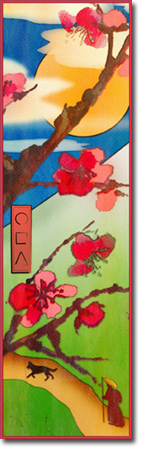On The Way: The Daily Zen Journal
A Single Handful
Ajahn Buddhadasa (1906-1993)

There aren’t that many fundamental, or root, principles of Dhamma. The Buddha said that his teaching is “a single handful.” A passage in the Samyutta-nikaya made this clear. While walking through the forest, the Buddha picked up a handful of fallen leaves and asked the monks who were present to decide which was the greater amount, the leaves in his hand or all the leaves in the forest.
Of course, they all said that there were many more leaves in the forest, and that the difference was beyond comparison. Try to imagine the truth of this scene; clearly see how huge the difference is. The Buddha then said that, similarly, those things which he had realized were a great amount, equal to all the leaves in the forest.
However, that which was necessary to know, those things which should be taught and practiced, were equal to the number of leaves in his hand.
From this, it can be seen that, compared to all the myriad things in the world, the root principles to be practiced for complete extinction of dukkha amount to a single handful. We must appreciate that this single handful is not a huge amount; it’s not something beyond our capabilities to reach and understand.
This is the first important point that we must grasp if we want to lay the foundation for a correct understanding of the Buddhist teachings.

We must understand the word “Buddhism” correctly. These days, that which is labeled as Buddhism or the Buddha’s teaching is a very nebulous thing, because it is so extensive that it has no limit or definition. In the Buddha’s time, a different word was used. The word was “Dhamma,” which specifically referred to the Dhamma (or teaching) that quenches dukkha.
The Dhamma of the Buddha was called “Samana Gotama’s Dhamma.” The Dhamma of another sect, say that of Nigantha Nataputta, would be called “Nigantha Nataputta’s Dhamma.” One who liked a particular Dhamma would try to study until he understood it, and then he would practice accordingly.
The Buddha’s Dhamma was genuine and pure Dhamma, without trappings, without any of the numerous things that have come to be associated with it in later times. Now we call those trappings “Buddhism.”
Due to our carelessness, Buddhism has become so nebulous that it now includes many things that were originally foreign to it.
You should observe that there is Buddhism, and then there are the things associated with Buddhism. These latter things are endless in number and variety, yet we mix them up with the former and call it all “Buddhism.”

The real Buddhist teachings alone are already abundant, as many as all the leaves in the forest. But that which has to be studied and practiced is a mere handful. Nowadays, we include those things that are merely associated with the teachings, such as the history of the religion or an explanation of the psychological aspects of the teachings.
Take the Abhidhamma (“Higher Dhamma”): some parts of it have become psychology and some parts philosophy. It’s continually expanding to fulfill requirements of those disciplines. In addition, there are many further offshoots, so that the things associated with Buddhism have become exceedingly numerous. They have all been swept in together under the single term “Buddhism,” so that it has become an enormous subject.
If we don’t know how to take hold of the essential points, we will think there are too many and we won’t be able to choose between them. It will be like going into a shop that sells a great variety of goods and being at a loss as to what to buy. So we just follow our common sense—a bit of this, a bit of that, as we see fit.

Mostly, we take those things that agree with our defilements (kilesa), rather than let ourselves be guided by mindfulness and wisdom. Then, spiritual life becomes a matter of superstition, of rites and rituals, and of making merit by rote or to insure against some kind of fear; and there is no contact with real Buddhism.
Let us know how to separate true Buddhism from those things that have merely come to be associated with it and included under the same name. Even in the teachings themselves, we must know how to distinguish the root principles, or essential points.
“I” and “Mine”
Now we will explain what spiritual disease is and how a single handful of Dhamma can cure it. Spiritual disease is the disease whose germ lies in the feeling of “we” and “ours,” of “I” and “mine” that is regularly present in the mind.
The germ that is already in the mind develops first into the feeling of “I” and “mine” and then, acting through the influence of self-centeredness, becomes greed, hatred, and delusion, causing trouble for both oneself and others. These are the symptoms of the spiritual disease that lies within us. To remember it easily, you can call it the disease of “I” and “mine.”
Every one of us has the disease of “I” and “mine.” We absorb more germs every time we see a form, hear a sound, smell an odor, touch a tangible object, taste a flavor, or think in the manner of an ignorant person. In other words, we receive the germs from those surrounding things that infect us and cause the disease every time there is sense contact.

We must recognize this germ, which is clinging, and see that it is of two kinds: attachment to “I” and attachment to “mine.” Attachment to “I” is the feeling that “I” is a special entity, that I am like this or like that, that I am the greatest, or something of the sort. “Mine” is taking something as belonging to me, that which I love, that which I like. Even that which we hate is regarded as “my enemy.” All this is called “mine.”
The feelings of I-ing and my-ing are so dangerous and poisonous that we call them the “spiritual disease.” Every branch of philosophy and Dhamma in the Buddha’s time wanted to wipe them out. Even the followers of other creeds had the same aim of wiping out I-ing and my-ing. The difference between other creeds and Buddhism is that when they eradicated those feelings, they called what remained the “True Self,” the “Pure Atman,” or “the Person.”
Buddhism refused to use these names because it didn’t want to cause any new attachment to self or things belonging to a self. The state free of I-ing and my-ing is considered simply to be a perfect voidness.
This voidness is called nibbana (nirvana in Sanskrit) as in the phrase “Nibbana is the supreme voidness.” Nibbana is absolutely void of “I” and “mine,” in every possible respect, without any remainder. Such is nibbana, the end of spiritual disease.
The matter of “I” and “mine” is very hard to see. If you don’t take a genuine interest in it, you won’t be able to understand that it is the force behind dukkha, the power behind spiritual disease.
Ajahn Buddhadasa (1906-1993)
Source – Heartwood of the Bodhi Tree – The Buddha’s Teaching on Voidness





This is a question that will stop any of us in our tracks. After so many years of practice and studying Buddhism and Zen, what would you say best represents the heart of the teaching? Do you think of the Diamond Sutra or Platform Sutra?
Do you rely on some of the basic principles of Buddhism, like the Four Noble Truths, the Six Perfections, or the Middle Way? Step back and imagine what it was like to be among those listening directly to the Buddha, and you will realize he taught many varied types of people. Does that confuse the matter even more?
Ajahn Buddhadasa dedicated his life and teaching to returning to the heart of the Buddha’s message before later commentaries and all the different schools came about. That handful of “leaves,” the essence of what is needed to know and practice, shaped his journey here.
All of us want to understand this handful of “leaves” the Buddha referred to. All the many teachers over the hundreds of years since Buddha lived are attempting to deliver this message, and if you read them, you can find the common threads.
And for those of you new to Buddhism, understanding the term dukkha is most helpful. In his first sermon in the Deer Park, Gotama tells us what dukkha means:
“This is dukkha: birth is painful, aging is painful, sickness is painful, death is painful, encountering what is not dear is painful, separation from what is dear is painful, not getting what one wants is painful. This psycho-physical condition is painful.”
So, once again, what would be your answer to the question of what is the heart of Buddhism? Worth pausing to contemplate a while.
Exploring with you,
Elana, Scribe for Daily Zen